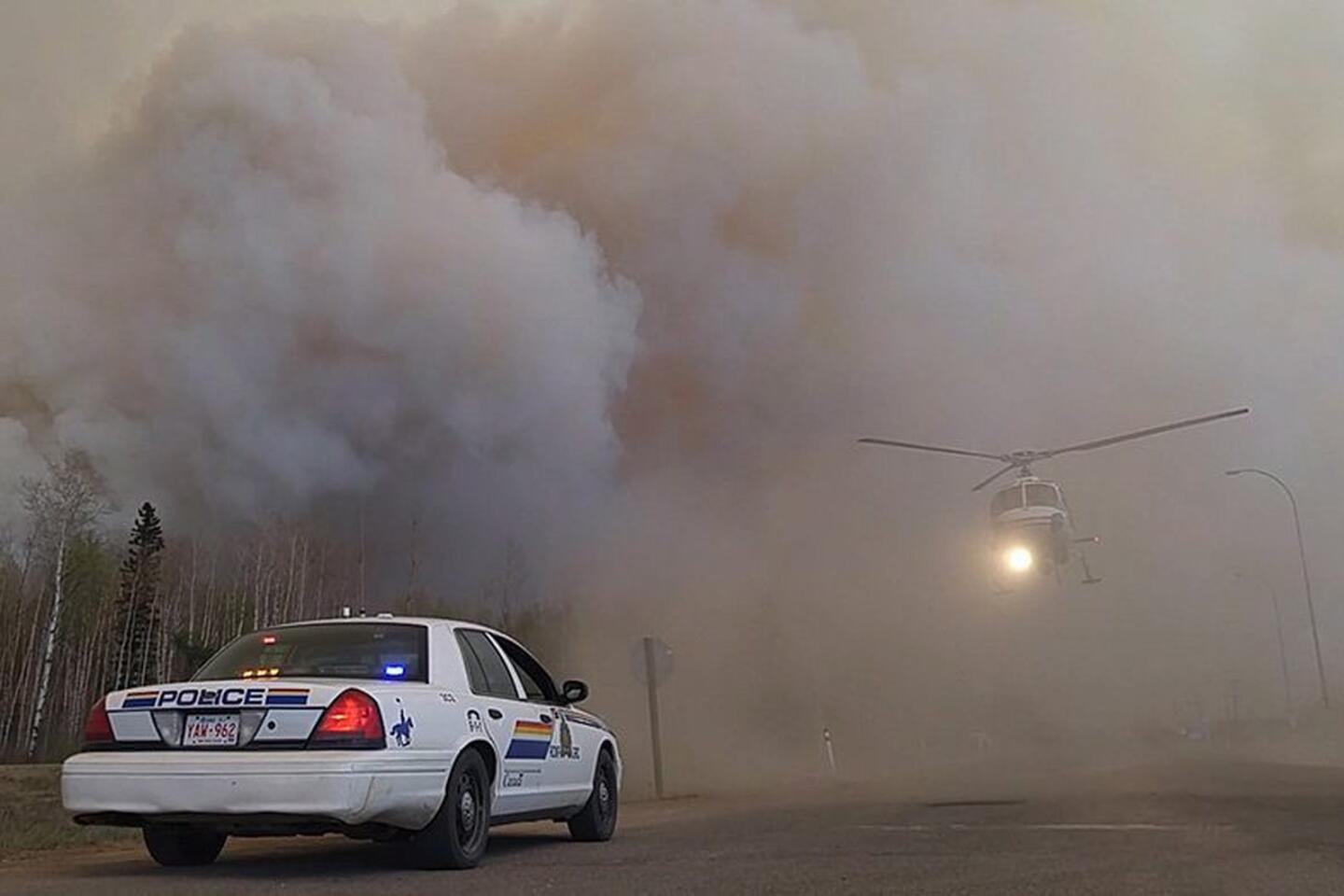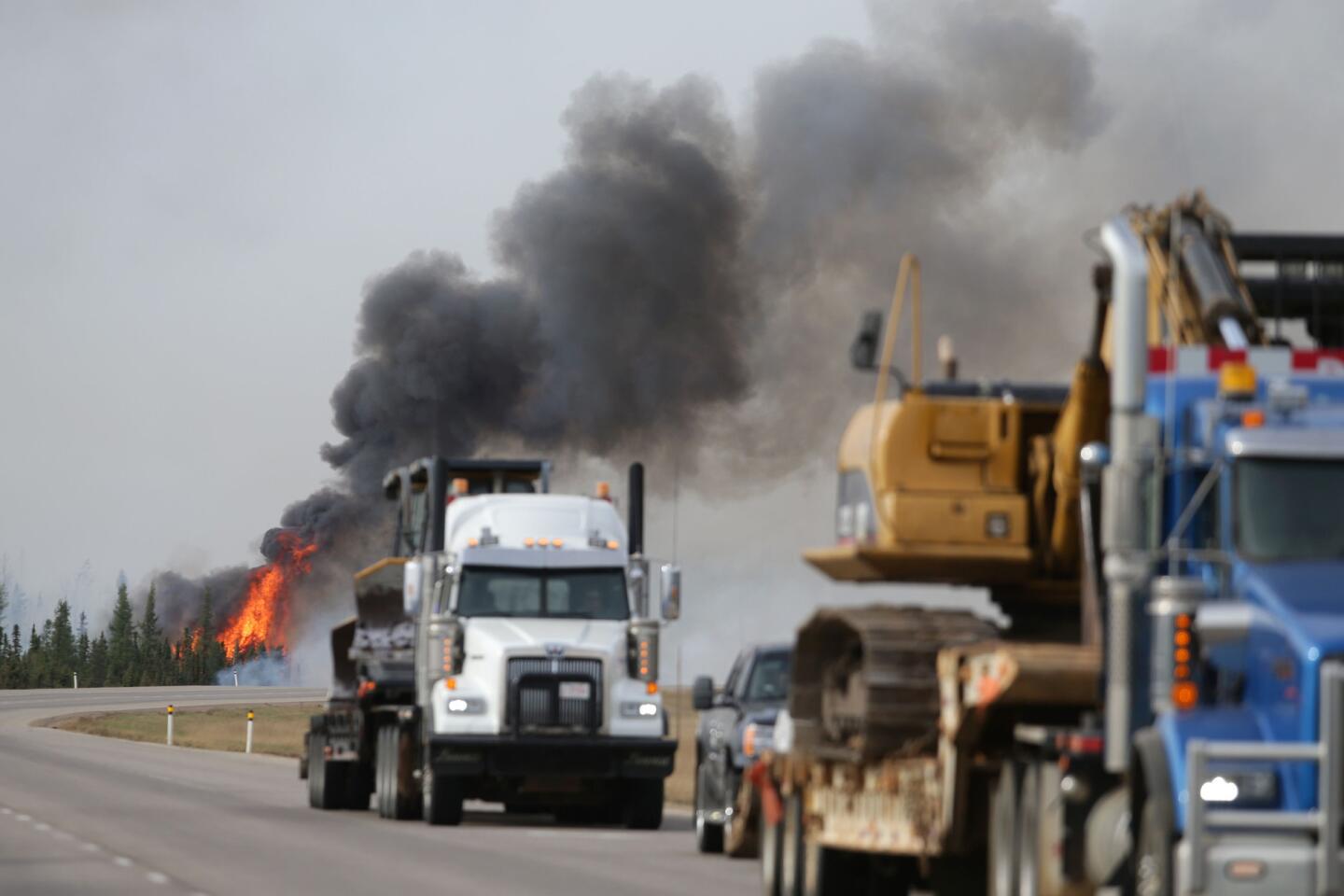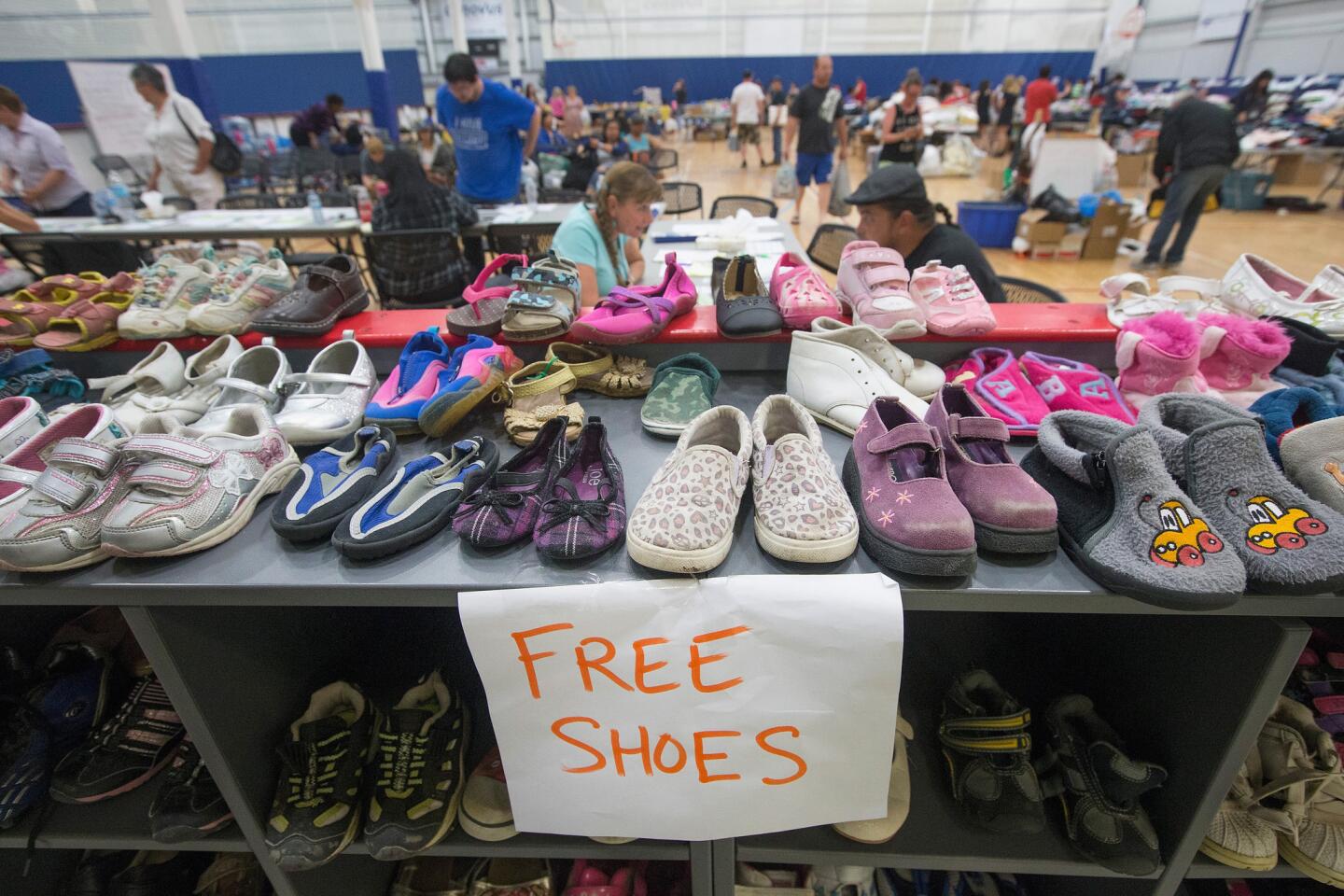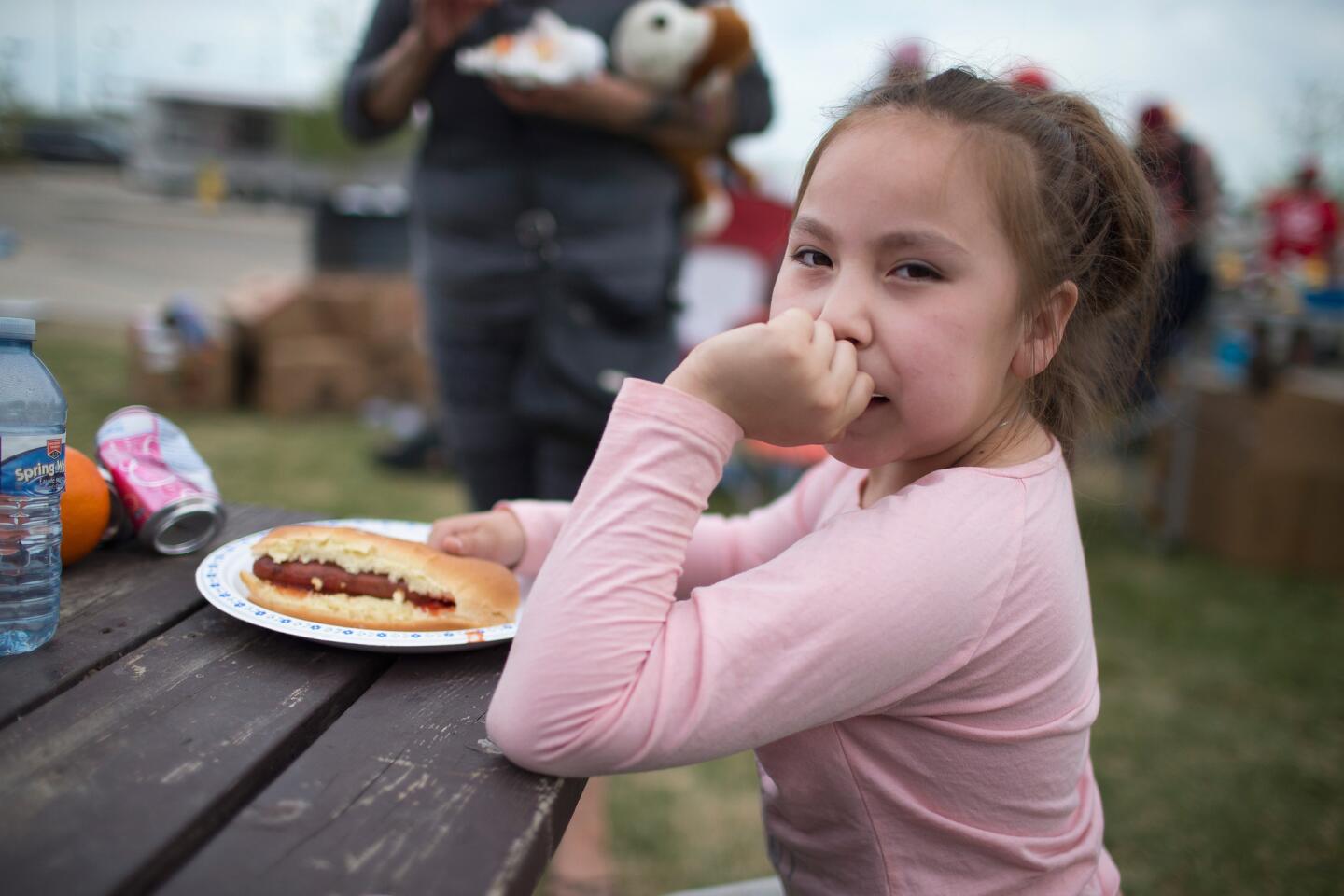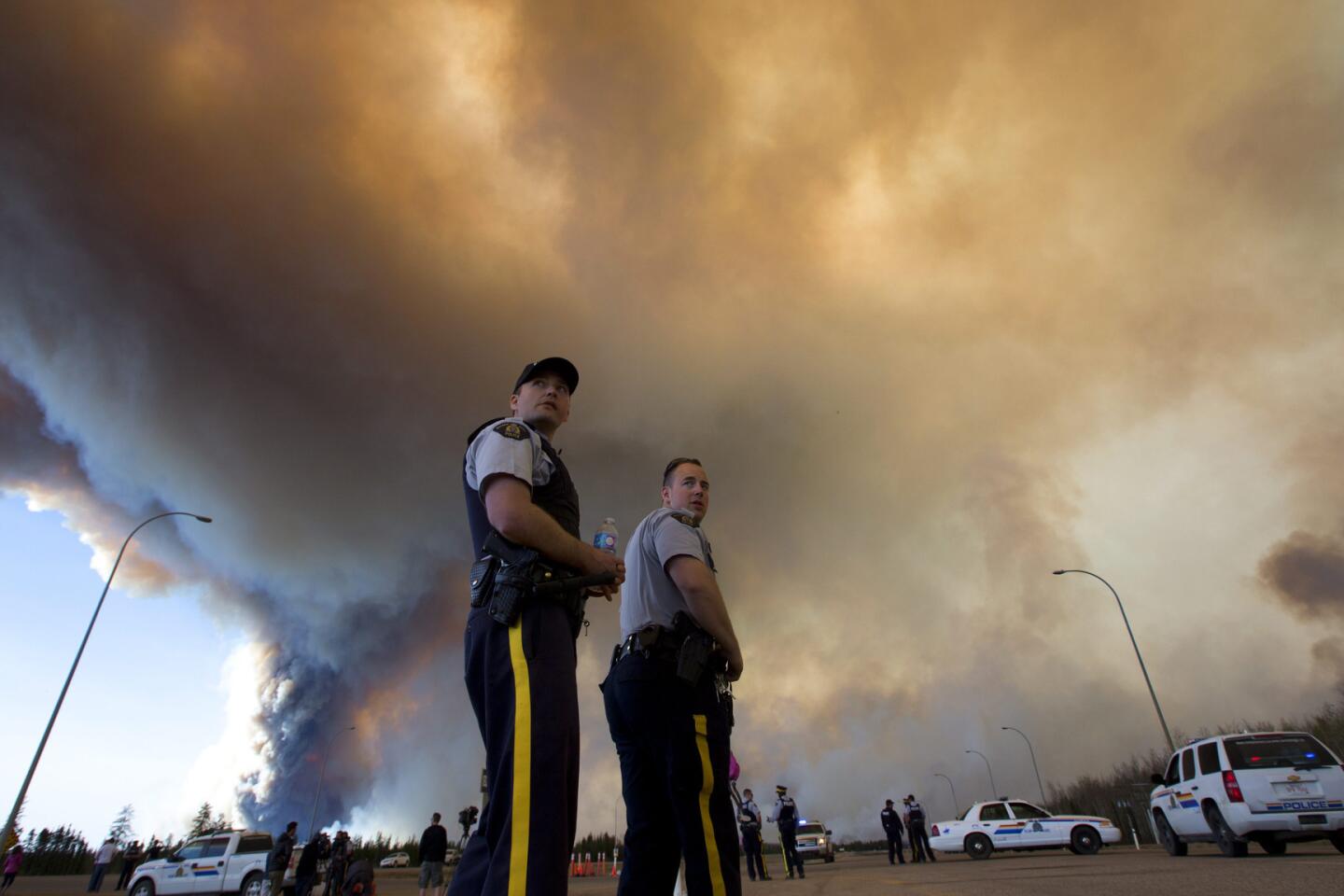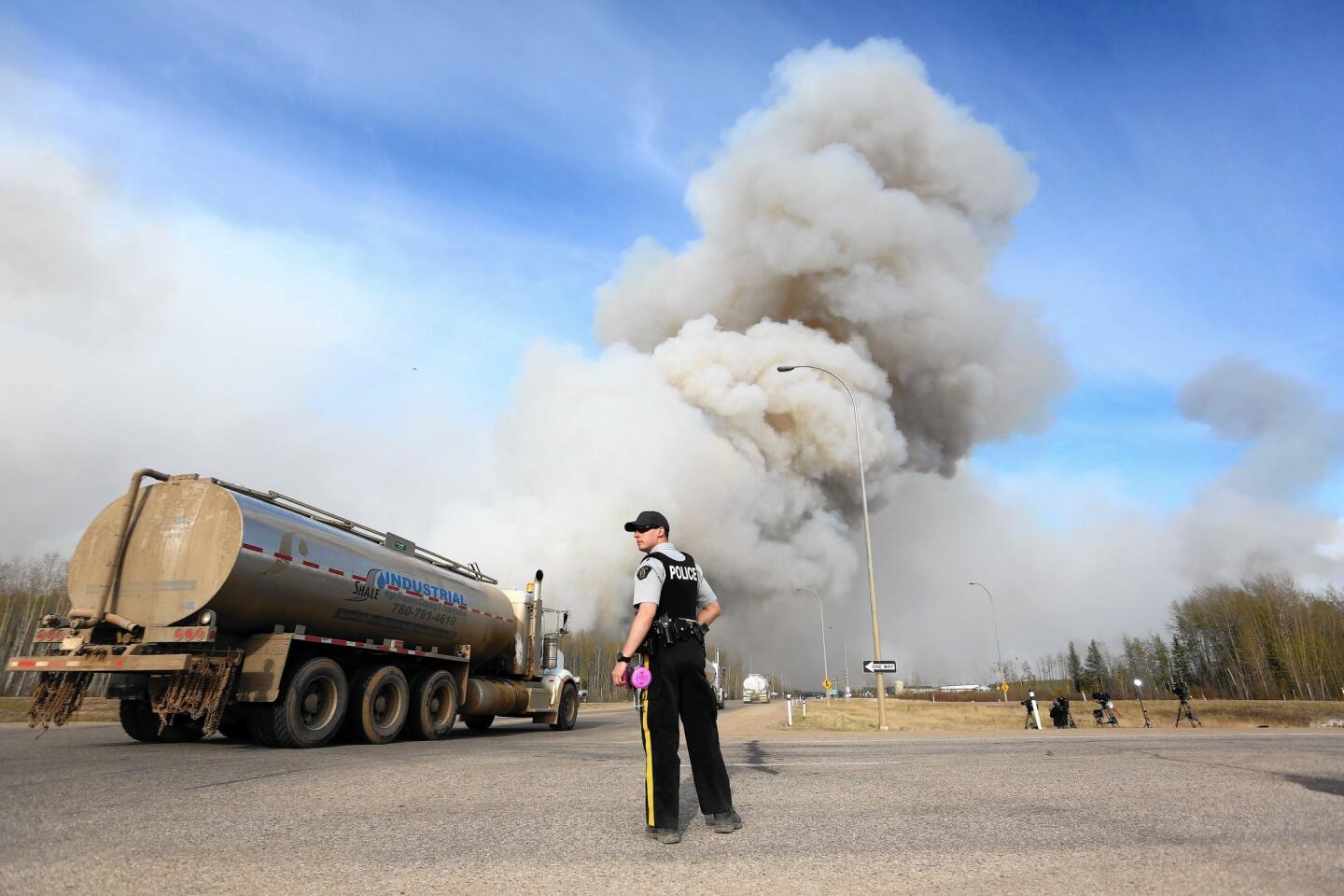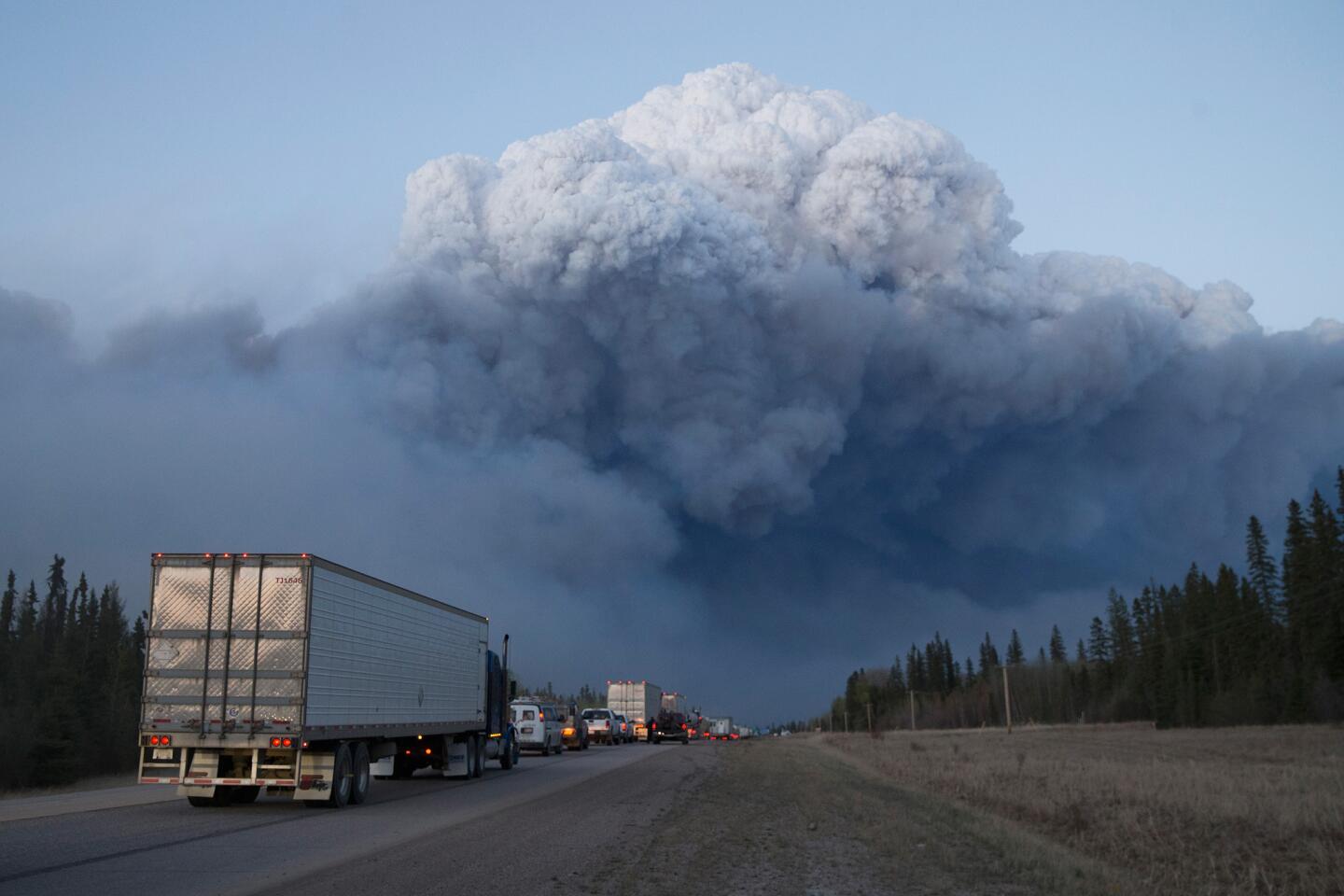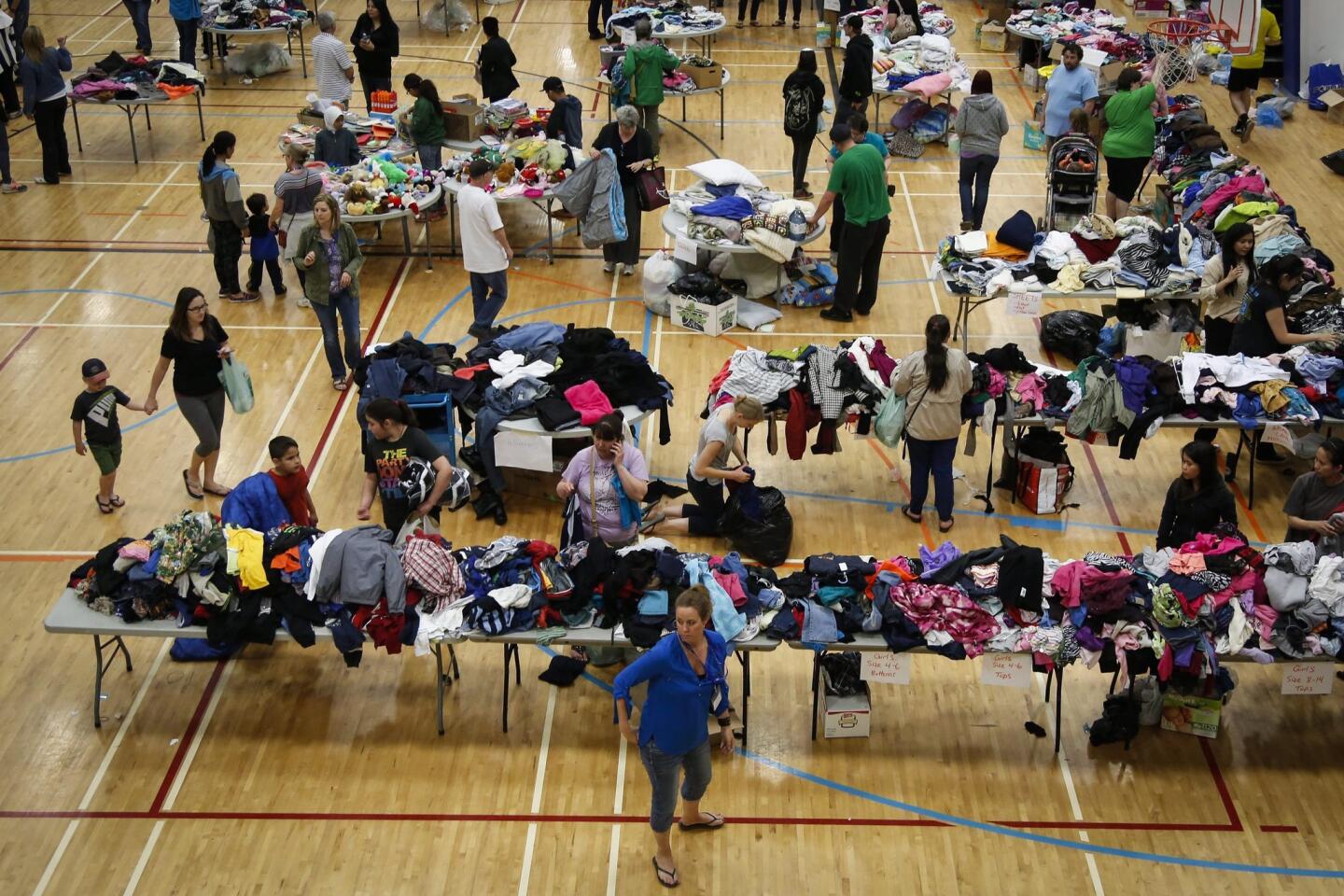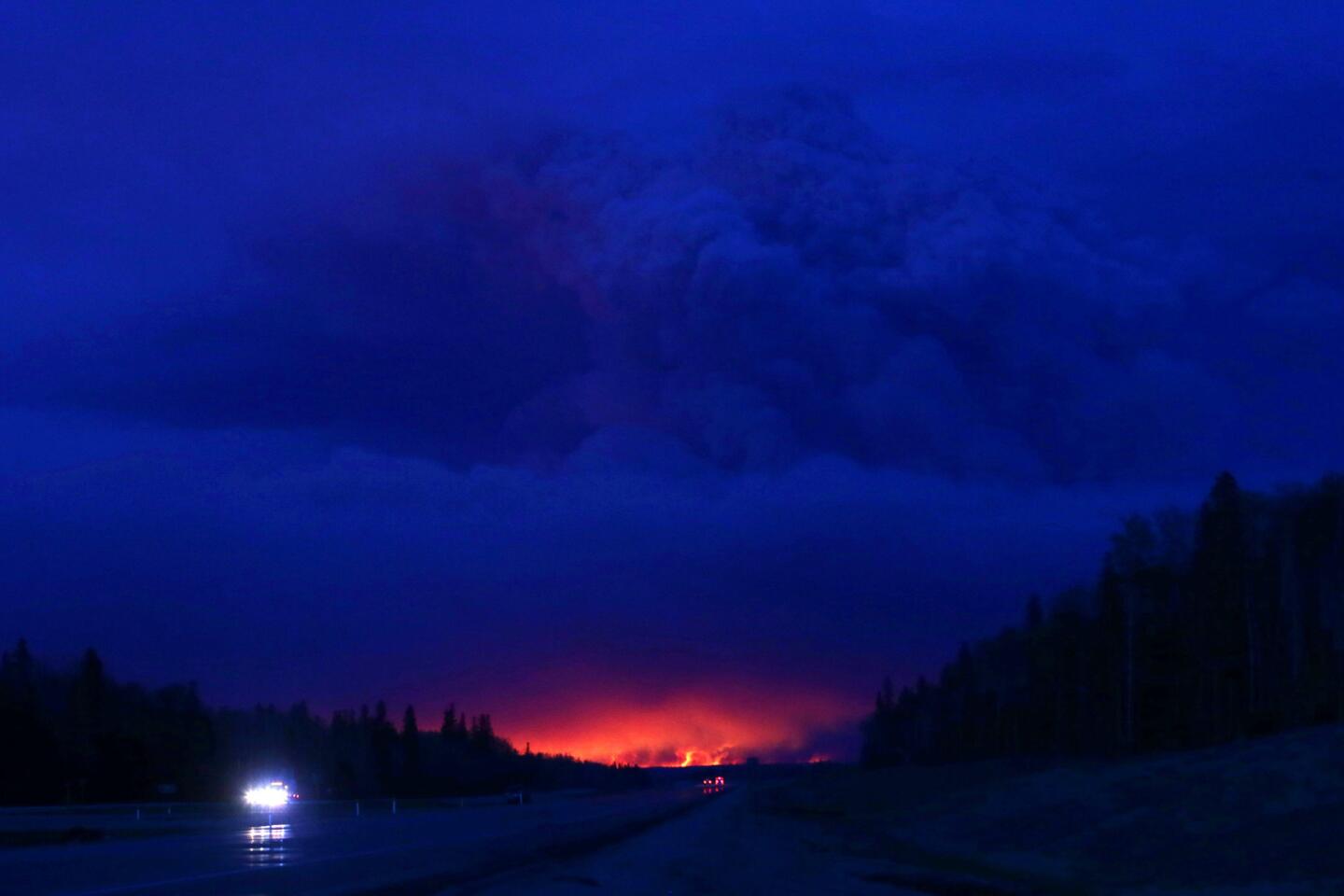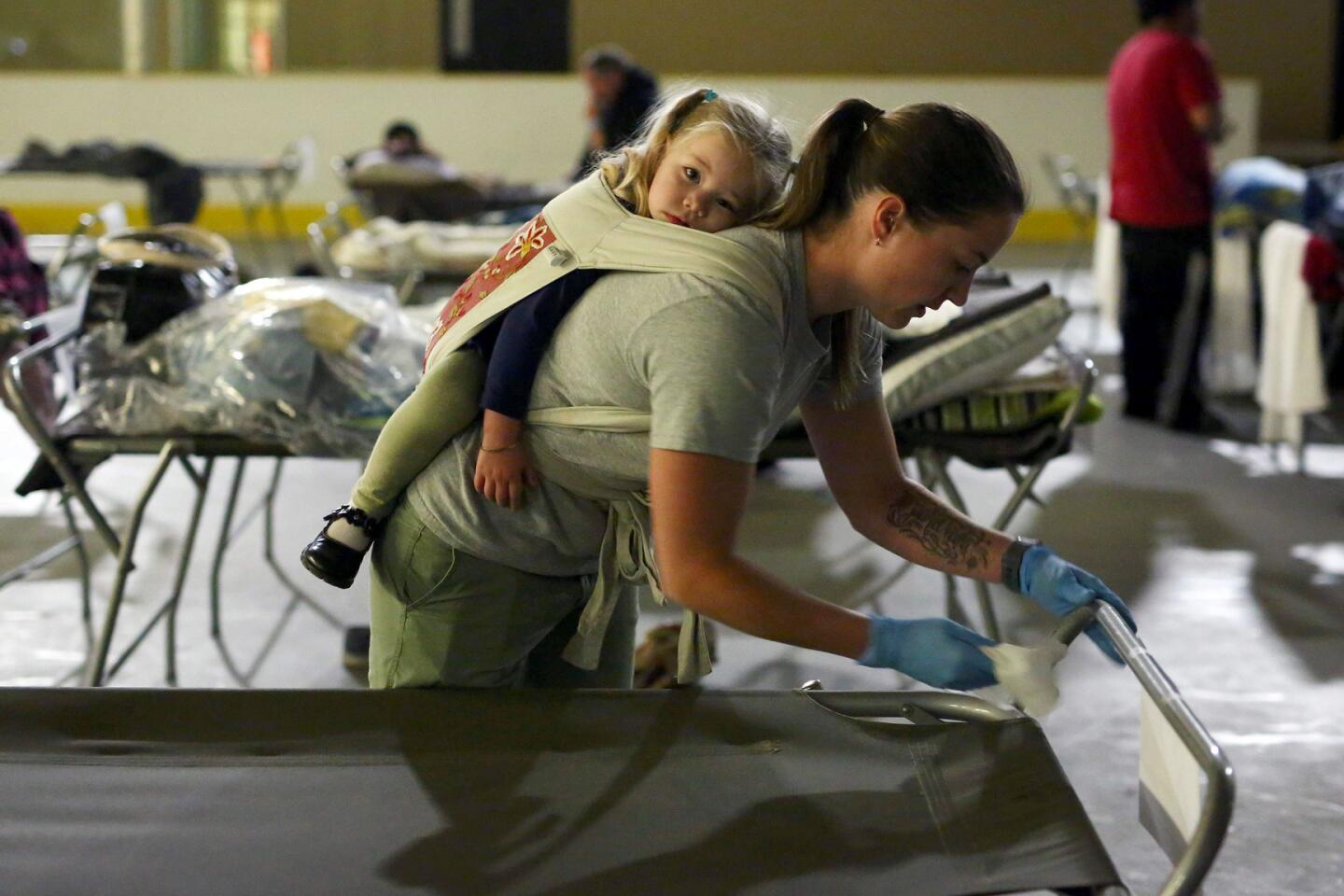Wildfire at Fort McMurray quickly overtakes Canada’s environmental debate
- Share via
reporting from WANDERING RIVER, Canada — A wildfire was growing just outside Fort McMurray, but Matt Hepditch went to work in the oil sands the way he always does.
Some people had evacuated, though reports the night before suggested the fire would move away from the hard-working city at the center of Canada’s oil industry.
Then the wind shifted.
“At 2 o’clock, they called us in and said, ‘If you want to go, you can go,’” Hepditch recalled. “Then chunks of ash started falling. That’s when I knew we had to leave.”
Hepditch rushed home to his girlfriend and their 3-year-old daughter and loaded the pickup.
That was Tuesday afternoon. It was the third day of May and 90 degrees. Within hours, “Fort Mac” would explode into fire and its nearly 90,000 residents would flee in a harrowing exodus.
People drove across fields, ran out of gas, abandoned their cars, hitched rides with strangers and watched their homes and neighborhoods burn on surveillance cameras linked to their phones even as they sped away. All the while, flames roared beside the road. A gas station erupted. It was hard to breathe.
I wish I could kick every person posting ‘That’s what you get for living by the oil sands’ comments.
— Tweet from an Edmonton woman
It was dangerous and digital and biblical, and no one knows what will become of the city they left behind or how it all will affect the oil industry. “The city of Fort McMurray is not safe to return to, and this will be true for a significant period of time,” Rachel Notley, Alberta’s premier, said Friday.
Though the cause of the fire has not been determined, the inferno has become symbolic of the tension within Canada over its role in climate change.
Some Canadians see the fire as nature lashing back at those who mistreat it in the name of profit.
Others see the hard science: a wildfire formed in conditions consistent with climate change striking with academic irony, not vengeance, in a place that helps supply the world with a fossil fuel. The evacuees were really climate refugees, they say.
Still others view it as just very bad luck, a setback the oil industry will find a way to overcome.
The debate reflects a country wrestling within itself at a difficult moment — and it is testing that famous Canadian civility.
A provincial politician who called the fire “karmic” was quickly castigated and later apologized. When Canadian Green Party leader Elizabeth May said the fire was “very related to the global climate crisis,” Prime Minister Justin Trudeau suggested she was making “a political argument.”
Some environmentalists have been accused of lecturing to or, worse, condemning people who have lost everything. In Fort McMurray, more than 2,000 structures were consumed by the flames.
“I wish I could kick every person posting ‘That’s what you get for living by the oil sands’ comments,” a young Edmonton woman tweeted Tuesday evening at the peak of the evacuation, when flames were whipping across Highway 63, the only road out of Fort McMurray. “You’re terrible people.”
Janet Keeping, the Green Party leader within Alberta, was among several people who invoked climate change early in the week — and did so without clearly expressing support for fire victims. She soon tried to strike a new chord.
“Caring about people means caring about #climatechange,” Keeping wrote Thursday on Twitter.
Alberta’s oil sands are said to hold the third largest reserves in the world, after Saudi Arabia and Venezuela. They made Alberta rich even as they have made Canada uneasy.
Conservation groups have long despised the intensive extraction process involved in gleaning crude from the sands — Alberta would have been the source for the Keystone XL oil pipeline that President Obama rejected last year — and many Canadians loathe what they view as an excessively capitalist culture in Fort McMurray.
Extraction industries such as logging and mining have long been essential here, and the sands provided high-paying jobs to thousands of workers who came from struggling parts of the country to Alberta.
But environmentalism has also been rising in Canada, particularly in urban areas and on the coasts, and Trudeau, elected last fall, is striving to reestablish the country as a progressive international player, including as a leader on climate issues.
Trudeau acknowledged that climate change will cause extreme weather events but added, “There have always been fires. There have always been floods. Pointing at any one incident and saying: ‘This is because of that’ is neither helpful, nor entirely accurate. We need to separate a pattern over time from any one event.”
The overwhelming public response to the fire has been sympathy for its victims, and many Canadians have been strikingly kind and generous. People offer to buy lunch for people they have never met. Free water and coffee have been easy to find. Some hotels have lowered their prices or let people stay for free.
A group of recent refugees from Syria has volunteered to help, as has the town of Lac-Megantic in Quebec, which is still recovering from the explosion of an oil train in 2013 that killed more than 40 people and destroyed much of its downtown.
When Hepditch and his family arrived here in the tiny town of Wandering River, they were amazed to see volunteers gathered at the fire hall handing out free clothes and serving burgers to anyone who showed up. With him was his older brother, Jeff, who also had fled with his girlfriend and their 4-month-old son.
“Everything we needed is right here,” Jeff Hepditch said.
Oil companies opened work camps to evacuees and, when the camps themselves had to be evacuated a few days later, they provided aircraft and other support to help transfer them. Some workers said their employers have called to check on them, promising to pay lost wages and in some cases provide substantial cash assistance in the coming weeks.
“The companies are being awesome,” said Tina Sinclair, who has worked for Shell for 13 years. “We’re not just numbers. They know us all by name.”
Sinclair, who moved to the city in 1978 when her father found a job in the sands, said Shell told her it would reimburse her and other employees up to $200 per day through May for any expenses.
She said outsiders do not know the real Fort McMurray. She pointed to the plight of Bo Cooper, a local firefighter whose battle with leukemia prompted residents to collect nearly $1 million last year so he could have an experimental treatment.
“Even though it’s 100,000 people, it’s family,” Sinclair said. “You want everybody to be OK.”
The fire is expected to grow, potentially doubling in size over the weekend, officials said, though it is moving for now into more remote areas. Substantial rain is the only thing that will stop it, they said, and there is little in the forecast.
Meteorologists had worried for months about the warm winter and spring in this part of Canada’s boreal forest. El Niño brought plenty of rain to the coast but not inland. What snow there was melted early. An early fire season seemed inevitable.
In April, highs near Fort McMurray reached 80 degrees on some days.
Then came May, when temperatures soared more than 30 degrees above average highs for this time of year. The fire started May 1.
“It’s a freak accident,” Jeff Hepditch said. “There’s not much you can do.”
The brothers, 27 and 25, both work in the oil sands. Their father runs a company that builds scaffolding there. Like many people, they moved from Newfoundland on the Atlantic Coast because jobs here were plentiful.
Now they were sitting outside tiny motel cabins in Wandering River and wondering what would happen. The oil industry had already slowed dramatically in recent months, cutting into their pay, though both have kept their jobs.
Layoffs left work camps emptier than usual, making room for evacuees. Now production has dropped by as much as a third because of the fire, analysts say.
The oil sands themselves are several miles north of town and they have not been threatened by the fire. Jeff Hepditch said the industry would never let them burn. His brother questioned that assessment.
“It gets so hot up there that you’ve got to expect something could happen,” Matt Hepditch said. “All it takes is ashes, right? Nobody thought that this would happen, either.”
Jeff Hepditch’s girlfriend, Stacey Carroll, weighed in: “That was my worst nightmare.”
She talked about the filth that covers Jeff when he comes home from the oil sands. The work takes a toll on the land, he conceded.
“What it does to the earth up there is disgusting,” he said. “It’s good money, though.”
ALSO
Police chase ends in Ontario with motorist jumping to his death
Uber conquered taxis. Now it’s going after everything else
In North Korea and trapped in a real-life version of ‘Waiting for Godot’
More to Read
Sign up for Essential California
The most important California stories and recommendations in your inbox every morning.
You may occasionally receive promotional content from the Los Angeles Times.
